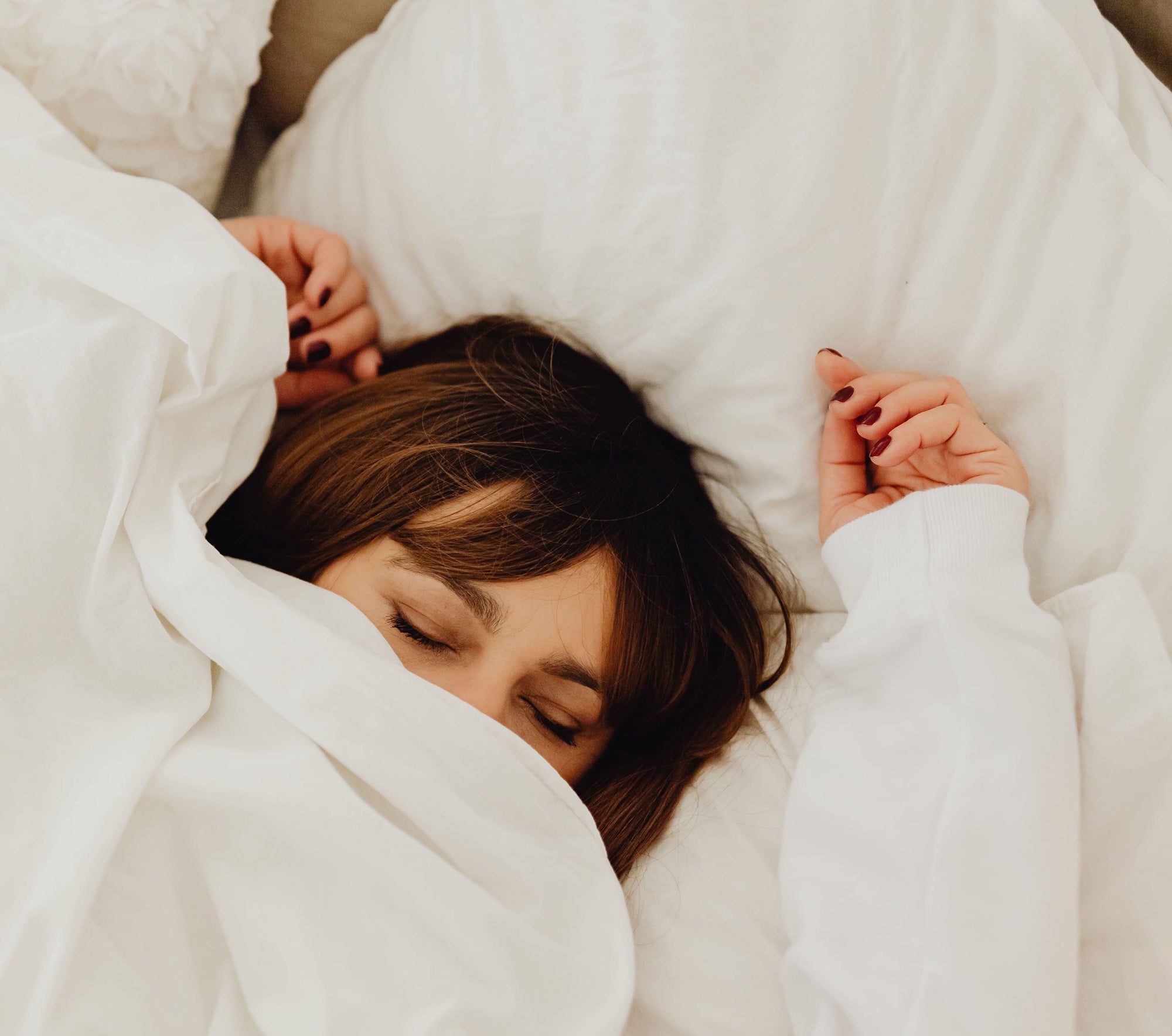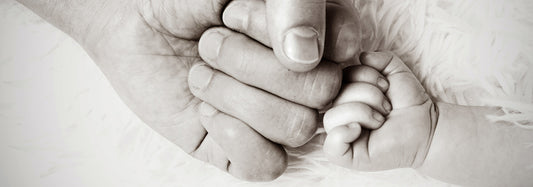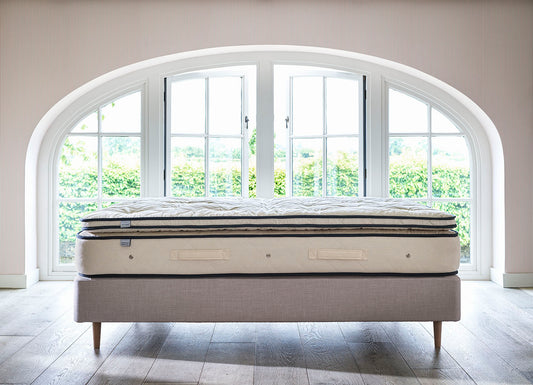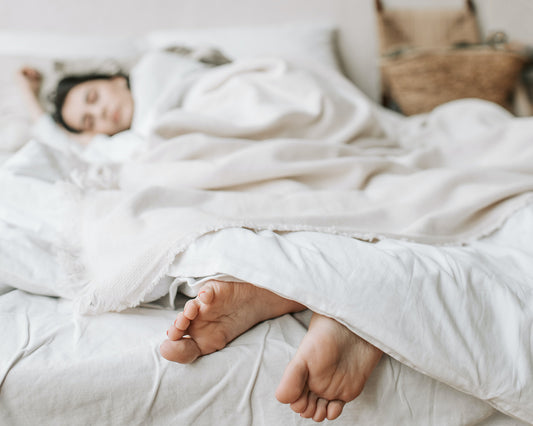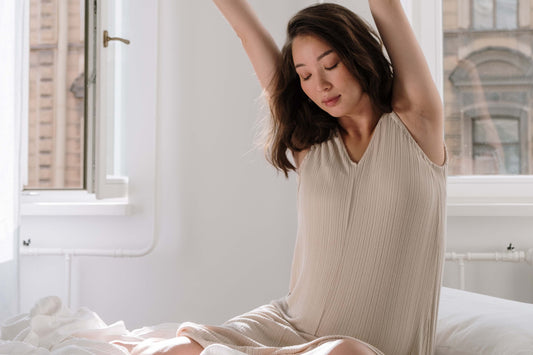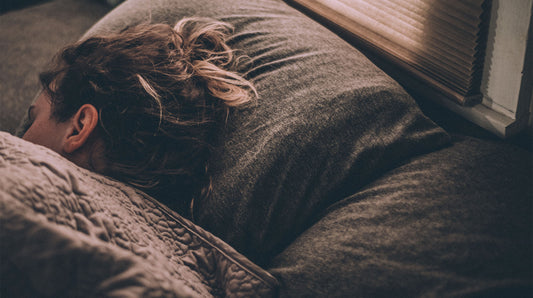One thing we can never stop talking about here at Naturalmat, is just how important sleep is. We spend about a third of our lives sleeping, so getting quality sleep is essential to leading a healthy lifestyle.
For women, this might be particularly challenging, since sleep for women is heavily influenced by changes in hormones, transitioning as they get older. We hosted an instagram live and had an interesting conversation with our in-house sleep expert, Christabel Majendie, about how sleep varies for women across different stages in their lives.
You can watch the recording of our live session on our Instagram.

Christabel is a Bristol based sleep therapist and consultant, specialising in helping individuals experiencing a wide range of sleep problems. For more information on her work you can visit her website.
We asked Christabel a few questions to help our audience understand how women can improve their sleep during PMT, Pregnancy and Menopause :
Is there a difference between sleep in men and women?
Yes, there is. Studies show the average woman sleeps a little more than the average man, between 5 and 30 minutes. However, despite this, women report more sleep problems and are more likely to have insomnia than men for all age groups. About one in three people, 30%, report sleep problems at some point in their lives. But, in a survey by the National Sleep Foundation, 67% of the women reported having sleep issues, so the prevalence is much higher.
How does sleep change over one's lifespan?
Both men and women experience more sleep problems with age. Unfortunately, as we get older, the systems that regulate our sleep weaken, so we experience more night time awakenings, less deep sleep and a reduction in night time sleep. Ours brains produce less melatonin as we age, which is the hormone that helps our bodies know it is time for sleep.
As we get older, the circadian rhythm, which is the internal body clock, also advances so people tend to wake up earlier. Because of this, they need to go to bed earlier but not everyone does. So this might be one reason why older adults get less sleep at night. The circadian rhythm in women is a bit more variable compared to men which possibly makes them more vulnerable to sleep issues.
Women, specifically, experience more sleep problems with about a third reporting issues in their 20s and this increasing through to the menopausal and post-menopausal years.
But for woman there are also additional factors, the main one being hormones. Sleep is affected by hormone changes that occur with the menstrual cycle, during pregnancy and then during the peri-menopausal years through to post-menopause.
In addition to that, more responsibilities at work and being a caregiver for elderly parents can add pressure to women’s lives at the time of the menopause. This added stress can translate into poor sleep.
What’s the right amount of sleep at any given time in my life?
The recommended amount of sleep for male and female adults is 7 to 9 hours every night. This is based on research that shows those who sleep less than 7 hours at night have an increased risk of developing a number of serious health problems including heart disease, diabetes, obesity, certain cancers, dementia and mental health issues.
Interestingly, you also see an association between reduced life expectancy and getting more than 9 hours of sleep. But this might well be because people who sleep for more than 9 hours are doing this because of underlying health problems rather than sleep being bad for them. Or because their quality of sleep is poor so they are having to spend more time in bed trying to rest which isn’t helpful.
Do we need less sleep as we get older then?
No, you need the same amount of sleep but it does get harder to achieve it!
You mentioned the Menstrual Cycle affects sleep. How does a woman’s period affect sleep?
Sleep is strongly influenced by core body temperature and this fluctuates in women over the menstrual cycle. In order to get to sleep, your core body temperature needs to drop and this coincides with a release of melatonin. This is why it’s harder to sleep in hot weather because this process is interfered with. Moreover, core body temperature is higher in women in the weeks leading up to menstruation, that’s the luteal phase, between days 15-28.
But it’s complicated because hormones also have a more direct influence on sleep. Progesterone, which is higher in the luteal phase, the second half of the cycle, can actually promote sleep via the neurotransmitter GABA. Estrogen, which dominates in the first half of the cycle during menstruation and ovulation, can suppress REM sleep which is important for emotion regulation.
What can you do to improve sleep through the Menstrual Cycle?
Good question! If you’re noticing you’re hotter at night during certain times of the month, you want to make sure you have appropriate bedding and bed clothes to manage fluctuations in body temperature.
You could maintain a sleep diary to record any patterns with sleep, temperature and times of the month and if you notice a pattern, make changes accordingly. You might not start the night hot but if you wake up hot in the night, try sleeping with less bedding and clothes.
Natural fibres are much better at regulating body temperature so make sure your bedding and bed clothes don’t contain manmade fibres. Natural duvets, pillows, sheets, blankets and mattresses made from natural fibres will keep you cooler. And that’s not a sales pitch for Naturalmat products but these are the facts!
General guidelines will help too, such as regular exercise, spending time in natural daylight, a healthy diet, minimal alcohol, avoiding caffeine in the afternoon and evenings, avoiding bright lights and electronics before bed and having a consistent wind down before heading to bed. And this is true for everyone, not just women!
What happens to sleep during Pregnancy?
Progesterone increases throughout pregnancy and estrogen peaks in the third trimester. You see disruption to sleep in the first and third trimester because of these changes in hormones but also due to increased urination at night, joint pain, leg cramps and general discomfort, and for some the uncertainty and anxiety that might come with pregnancy.
As well as insomnia, during pregnancy we also see an increase in sleep disorders such as obstructive sleep apnea, which is disordered breathing during sleep, and restless leg syndrome (RLS) which is an uncomfortable feeling in the legs that happens in the evenings and is relieved by movement. RLS is often due to low ferritin or iron levels.
If you think you have a sleep disorder during pregnancy, or your sleep is disrupted due to a medical issue, speak to a doctor about getting assessed. If your disrupted sleep is due to an underlying problem such as anxiety, you might want to speak to a sleep therapist to work on it.
Should you change your sleep if you are pregnant?
During the first trimester, the sudden increase in progesterone can cause drowsiness and an increase in sleep need. If you need to go to bed earlier, lie down for a bit or nap in the day. Listen to your body. But, if by doing this you notice you can’t sleep at night, you want to limit day time sleeping and avoid it too close to bed time possibly aiming for 20-30 minutes before 3pm.
Sleeping on your side generally is the more comfortable position and will reduce the chances of sleep apnea.
How is sleep affected by Menopause?
During the peri-menopausal years, women report more sleep complaints and unfortunately these only increase into the post-menopausal years.
The drop in estrogen can lead to hot flashes at night, changes in progesterone can affect your ability to initiate and maintain sleep, changes in serotonin and dopamine can cause anxiety and problems with mood regulation all of which can affect your sleep. And disrupted sleep worsens these mood issues. Women often report problems waking in the middle of the night and not being able to get back to sleep or waking too early.
You may also experience weight gain, increased risk of obstructive sleep apnea and restless leg syndrome which can disrupt sleep.
How can women get better sleep during Menopause?
There are medical options such as HRT, anti-depressants and hypnotics (sleep medication) which can reduce symptoms of menopause, reduce hot flashes and reduce sleep disruption. Speak to your doctor about your options and their benefits and risks.
But for non-pharmacological options there is some evidence that soy-based products help to improve sleep quality and menopause symptoms and this is because of the plant estrogen they contain. There is some evidence for ginseng, red clover and black cohosh but more research is certainly needed for these supplements.
Lifestyle factors can make a big difference: limiting caffeine 8-10 hours before bed, limiting alcohol, avoiding smoking an hour or two before bed as it’s a stimulant, regular exercise and no heavy meals two hours before sleep. Reducing fluids after dinner and avoiding spicy or acidic food as your last meal might also prove beneficial.
With the bedroom, keep the bed mainly for sleep and sex. Make the room dark, quiet and comfortable. Keep your bed cooler than usual and reduce bedding and bed clothes as mentioned. Sweat management bedclothes made of natural fibres can be helpful (eg. made from bamboo) and having a glass of water and a change of clothes by the bed.
Try having a relaxing wind down an hour before bed such as reading, listening to music or meditation and avoid electronics. If you have a bath in the evening, allow enough time for your body temperature to cool down, so an hour or two before bed. If you struggle with a racing mind and anxiety, try writing all this down in a worry journal in the evening but then make sure you do your wind down afterwards.
And what if you are already doing all of this and you still wake up in the night?
Waking in the night is normal behaviour so don’t stress over this, as it will only fuel the sleep problem. If you stay relaxed, you’re more likely to get back to sleep. Watch out for thoughts that stress you out like “I’m going to feel awful tomorrow” or “I’ll never get back to sleep.” Try and think of alternative thoughts that calm you down.
It’s best not to look at the time when you wake as this is an alerting behaviour – it wakes you up even more. When you wake, aim to stay relaxed, maybe by focusing on your breath or the nice things about being in bed such as the feel of the pillow or the duvet.
If you are lying in bed for a long time and are still unable to get back to sleep, say an estimated 20 minutes without clock watching, it’s best to get out of bed for a little while to reset. Get up and go to another room to relax as you would before bed. Avoid electronics and bright lights but you could read a book in dim lights or listen to music or try meditating. Then go back to bed after about 30 minutes and try again. This prevents you getting frustrated or anxious about not sleeping and keeps the bed associated with sleep rather than wakefulness.
Is there any other help you can recommend?
If your sleep issues have been going on for a number of months, it might be worth doing some CBTi, Cognitive Behavioural Therapy for insomnia. This is the evidence-based treatment for insomnia and is more effective than sleeping pills.
You might be able to do this through your GP who can give you access to a CBTi program online. Or you could find a private therapist who does CBTi (this is different to general CBT as it’s different training). CBTi has been shown to reduce awakenings, anxiety and depression in menopausal woman.
You can watch the full interview and other interesting bits on our Instagram page.

